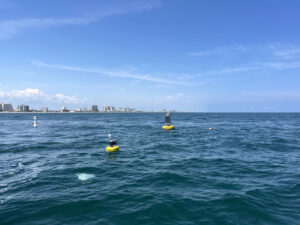Aanderaa 4296 Turbidity Sensors
Features
- Smart sensor technology for plug-and-play interface
- Enter site specific reference data to receive absolute values in mg/L
- 3 depth ranges available: 300, 3000 and 6000 meters
- Expedited repair and warranty service
- Lifetime technical support
- More
Overview
The Aanderaa 4296 Turbidity Sensor fits directly on the SeaGuardII top-end plate and is interfaced by means of a reliable CAN bus interface (AiCaP), using XML for plug-and-play capabilities. The sensor can also be used as a stand-alone sensor with RS-232 output. The sensor is available in three different depth ratings: 300-meter, 3000-meter and 6000-meter.
Mechanics
The Aanderaa Turbidity Sensor measures the backscatter of infrared light. A high-efficiency light-emitting diode is used to transmit modulated light into the water. The backscattered light is picked up by a sensitive photodiode, and this signal is then conditioned, linearized and converted to data in the engineering unit (FTU). In addition to turbidity, the sensor also measures water temperature.
In The News
Supplying Seattle’s Drinking Water: Using Data Buoys to Monitor the Cedar River Municipal Watershed
Providing clean, safe, and reliable drinking water for the 1.6 million people in the greater Seattle area is a top priority for Seattle Public Utilities (SPU). With limited water supplies, SPU dedicates considerable resources to maintain its watersheds and mountain reservoirs. About 70 percent of Seattle Water comes from the Cedar River Municipal Watershed , and the other 30 percent comes from the South Fork Tolt River Watershed . [caption id="attachment_39574" align="alignnone" width="940"] Data buoy in Chester Morse Lake. Data buoy in Masonry Pool. (Credit: Kevin Johnson / Seattle Public Utilities) [/caption] Jamie Thompson, a fisheries biologist at SPU, monitors aquatic ecosystems centered on fish listed under the U.S. Endangered Species Act (ESA).
Read MoreData-Driven Advocacy on the Lower Deschutes River
Like many freshwater environments, the Deschutes River in Oregon is under pressure from development, pollution, and climate change. Many rivers, streams and lakes in the Deschutes Basin do not meet Oregon water quality standards –where state water quality monitoring assesses levels of bacteria, pH, dissolved oxygen, temperature, and fine sediment. Hannah Camel is the Water Quality Coordinator for the Deschutes River Alliance (DRA), a non-profit organization that focuses on the health of the lower 100 miles of the Deschutes River–the area most affected by human intervention. As a data-driven organization, the DRA has benefited from the installation of two NexSens X2 data loggers.
Read MoreExpanding the Port Everglades: Real-Time Monitoring of Water Quality Conditions from Planned Dredging Operation
The Port Everglades in Broward County, Florida, serves large trade vessels and cruiseliners and incoming and outgoing recreational boaters. However, as cargo ships become larger, the port must expand. A dredging project led by the US Army Corps of Engineers will substantially deepen and widen the port's navigation channel to accommodate larger Panamax cargo ships and modern cruise liners. As a result of this project, a large amount of sediment will be displaced into the water column. This suspended sediment may settle outside of the project area, burying benthic organisms like corals, and possibly carrying harmful particulates to other regions. [caption id="attachment_39497" align="aligncenter" width="2560"] A CB-950 and CB-25 deployed on site at Port Everglades.
Read More


























